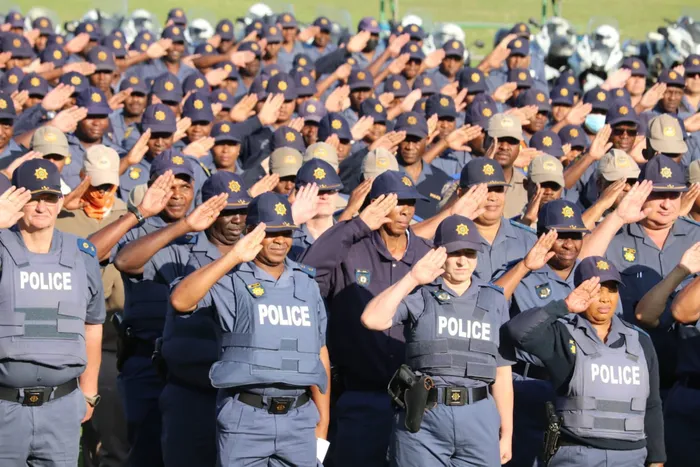
South African police trust hits 27-year low at 22%, according to HSRC survey, amid political scandal and corruption allegations. New inquiry aims to restore public confidence and ensure accountability within law enforcement.
Image: File
Police trust in South Africa has reached its lowest level in 27 years, according to a Social Attitudes Survey released by the Human Sciences Research Council (HSRC) on Monday.
The findings come amid a growing political crisis following damning allegations by KwaZulu-Natal Police Commissioner Lieutenant General Nhlanhla Mkhwanazi against Police Minister Senzo Mchunu.
The survey shows that only 22% of South Africans expressed confidence in the police in 2022, with similarly low levels recorded in 2023 and 2024/25.
This marks the worst confidence ratings since data collection began in 1998.
“A majority of the adult public never expressed trust in the police,” said Dr Benjamin Roberts, HSRC research director and principal investigator of the study.
“The findings are expected to inform interventions aimed at restoring public faith in the police. By adopting a more community-focused and accountable approach to policing, we can work towards creating safer and more secure communities for all South Africans.”
Trust in the South African Police Service (SAPS) has remained low for decades.
Between 1998 and 2010, trust levels hovered between 39% and 42%. Confidence fell sharply after the 2012 Marikana massacre and dipped even lower following the July 2021 unrest, when only 27% of respondents expressed trust in the police, he said.
Roberts, however, noted that confidence had almost returned to the 2011 level by the time of the 2015 survey round.
He highlighted that the 2016 to 2020 period was characterised by modest fluctuation between 31% and 35%.
''The hard COVID-19 lockdown experience, which included instances of police brutality in enforcing lockdown regulations, did not appear to have had an aggregate effect on confidence levels based on the 2020 survey results.
''In 2021, public trust in the police dipped to a low of 27%. This appears to be linked to the July 2021 social unrest. Many criticised the poor performance of the police during the unrest. This was followed by a further 5 percentage point decline to 22% in 2022, with the 2023 and 2024/25 confidence levels almost unchanged, which may reflect increasing rates for certain crimes.''
The situation worsened in 2022, dropping to 22%, a historic low that has not recovered. “The 2022, 2023, and 2024/25 figures are the lowest recorded in 27 years,” the HSRC report states.
The release of the survey coincided with a major political scandal involving allegations of corruption and interference in police operations.
At a press briefing in Durban on July 6, 2025, Mkhwanazi accused Mchunu of disbanding a task team investigating political killings. He alleged that over 121 sensitive case dockets were removed and shelved, and claimed that Mchunu and other senior officials were protecting a syndicate involving politicians, police, prosecutors, and members of the judiciary.
Mchunu denied the allegations, dismissing Mkhwanazi's claims as "baseless and without evidence."
In response to the fallout, President Cyril Ramaphosa on Saturday announced the establishment of a judicial commission of inquiry to investigate the allegations. Ramaphosa placed Mchunu on immediate leave and appointed Professor Firoz Cachalia as acting Minister of Police.
Cachalia is expected to officially take up the post in August.
Ramaphosa has tasked Acting Deputy Chief Justice Mbuyiseli Madlanga with heading the commission, alongside senior advocates Sesi Baloyi and Sandile Khumalo.
He stated that the inquiry would probe allegations that criminal networks have infiltrated police, intelligence, and prosecutorial agencies, manipulated investigations, and targeted whistleblowers. The commission will have powers to recommend suspensions, refer cases for urgent criminal investigation, and propose institutional reforms.
The inquiry is expected to deliver interim reports after three and six months, with a final report submitted to Ramaphosa, the Speaker of the National Assembly, and the Chief Justice. It will also assess existing oversight mechanisms, recommend disciplinary action and prosecutions, and suggest broader reforms to rebuild public trust in law enforcement.
“These allegations, if proven true, threaten to undermine public confidence in the ability of the police service and other arms of the state to perform their duties without fear or favour,” Ramaphosa said.
The HSRC survey and the ongoing political crisis within SAPS highlight the depth of the legitimacy challenges facing law enforcement in South Africa. With trust in the police at its lowest recorded level in nearly three decades, efforts to rebuild confidence remain urgent.
“We hope that this work will be used to design interventions to restore the public’s faith in the police,'' said Roberts.
hope.ntanzi@iol.co.za
IOL Politics
Related Topics: